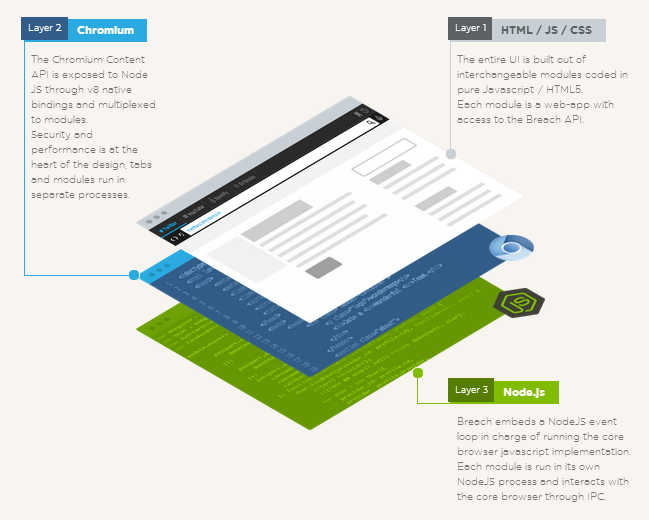| Breach - A JavaScript Chrome Web Browser |
| Written by Ian Elliot |
| Saturday, 12 July 2014 |
|
Breach is being billed as a 100% JavaScript web browser. You'll quickly discover that actually it isn't, but it is still interesting and provides a way to build custom browser interfaces using mainly JavaScript. It is a little known, or perhaps oft forgotten, fact that the Firefox UI is implemented using nothing but JavaScript and a markup language, XUL. For reasons that are difficult to fathom, Mozilla has never really manged to get this idea across and so far still hasn't managed to make the system simple enough for the average programmer to understand, let alone use. What Breach, which has just reached a public alpha, is all about is creating the UI of a browser using nothing but JavaScript. The big lifting is still done by a Chromium Content Module layer and, of course, the JavaScript is run using V8 and Node.js. So it isn't really fair to call it 100% JavaScript in that there are some 2 million lines of C++ in the Chromium module alone. However while you can see that converting the 2 million lines C++ needed to deal with the inner workings of a browser to JavaScript might be possible, it wouldn't be a good idea.
What Breach does is to hook into the Chromium content module and build the UI using JavaScript. Essentially all of the UI is made up of modular web apps, i.e. JavaScript, HTML and CSS. This means you can customize the browser at a very deep level. You can also change the browser's UI. As the documentation points out, if you want vertical tabs you can implement them using JavaScript and CSS. One very odd consequence of the modular web app construction is that you can open modules in other browsers. Overall, Breach doesn't really bring any thing very new to the table. As already mentioned, the Firefox UI is entirely generated using JavaScript and XUL. However, working with Firefox is tough and Breach is much easier to understand, and hence to modify.
More InformationRelated ArticlesWebkit.js - Who Needs A Browser? js2js The Revolution In JavaScript Vanilla JS Used On More Sites Than jQuery Getting Started With TypeScript Java, ASM.js Or Native - Which Is Faster?
To be informed about new articles on I Programmer, install the I Programmer Toolbar, subscribe to the RSS feed, follow us on, Twitter, Facebook, Google+ or Linkedin, or sign up for our weekly newsletter.
Comments
or email your comment to: comments@i-programmer.info |
| Last Updated ( Saturday, 12 July 2014 ) |


